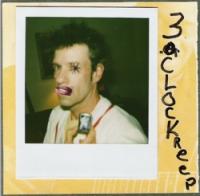As the music industry continues its decline, the question of what the best format for distribution of new material has been raised frequently. Should digital releases be completely free? How about donations? High-quality box sets? These are all ideas that have been championed by heavyweights such as Radiohead and Nine Inch Nails, but what about the artist that isn't on nearly the same level as the giants?
Beginning with the sounds of multiple recordings, Paul Westerberg's 3oclockreep opens with "Tell âEm All to Go to Hell," a bluesy garage tune recorded in Westerberg's own studio. Like early Guided by Voices records, songs bleed together and over each other, creating a collage of distortion and yelling before giving away to a moment of beauty. The songs "It's Ridiculous Everybody Wants to Be Famous" and "Only Excuse Is" both fight their way through other snippets of guitar-heavy songs before prevailing with their majestic yet somber piano chords. The first five tracks of 3oclockreep were all recorded in August of 2008, yet there's something strangely nostalgic about them. It's as if Westerberg is channeling the energy he had 20 years ago, which allows for the new songs to blend well with the last four tracks recorded in 1989 with Tom Waits.
Beginning with a drunken, stumbling version of the classic "If Only You Were Lonely," Tom Waits attempts to sing but instead starts and stops before crumbling to studio ramblings. The tape runs as two geniuses interact and discuss what to play before closing with two blues-based tracks ("We Know the Night" and "Lowdown Monkey Blues") that Waits and Westerberg trade vocals on. It's gritty, sloppy and warm all at the same time. The grit of Waits and the warmth of Westerberg compliment each other to produce two drunken tracks of splendor.
The album closes with "Finally Here Once." Like the opening tracks, it was recorded in August and is by far the clearest and cleanest of all the songs. Though a rough recording, it exhibits even more the brilliance of Westerberg's writing abilities. The whole album does that. It's a breath of fresh air to hear music that relies more on the strength of the songs and the abilities of the writer than of how good the "sound" is. Paul Westerberg proves that no matter how good the quality of a recording, if the songs are strong that is all that matters.
Was any less ever expected?
